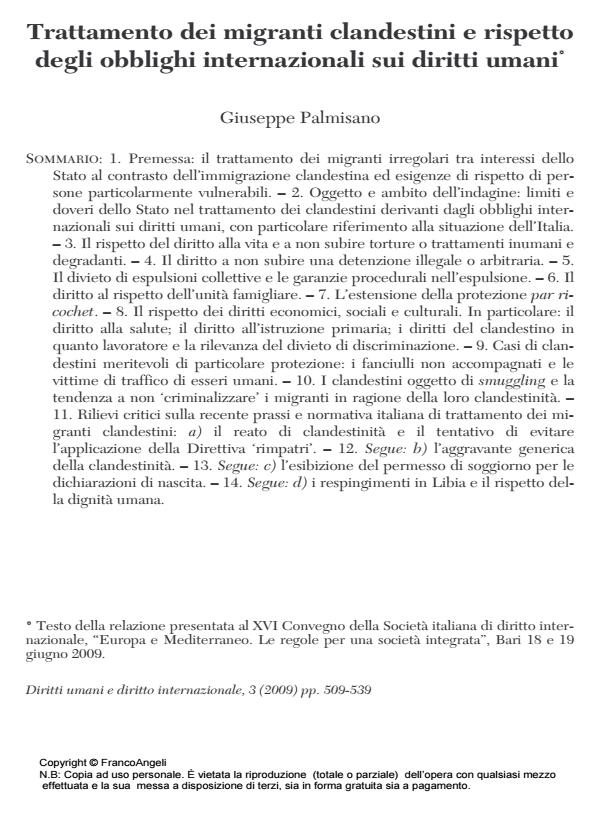Trattamento dei migranti clandestini e rispetto degli obblighi internazionali sui diritti umani
Titolo Rivista DIRITTI UMANI E DIRITTO INTERNAZIONALE
Autori/Curatori Giuseppe Palmisano
Anno di pubblicazione 2009 Fascicolo 2009/3
Lingua Italiano Numero pagine 31 P. 509-539 Dimensione file 418 KB
DOI 10.3280/DUDI2009-003005
Il DOI è il codice a barre della proprietà intellettuale: per saperne di più
clicca qui
Qui sotto puoi vedere in anteprima la prima pagina di questo articolo.
Se questo articolo ti interessa, lo puoi acquistare (e scaricare in formato pdf) seguendo le facili indicazioni per acquistare il download credit. Acquista Download Credits per scaricare questo Articolo in formato PDF

FrancoAngeli è membro della Publishers International Linking Association, Inc (PILA)associazione indipendente e non profit per facilitare (attraverso i servizi tecnologici implementati da CrossRef.org) l’accesso degli studiosi ai contenuti digitali nelle pubblicazioni professionali e scientifiche
Treatment of irregular migrants and compliance with international obligations protecting basic human rights - The legislative and operational measures recently adopted by Italy in order to prevent and repress clandestine immigration raise the problem of their consistency with Italy’s international obligations conncerning the protection of human rights. With a view to assessing the actual terms of such a problem, contents and extent of the protection to be afforded to irregular migrants, under the international law of human rights, must be preliminarily determined. Considering the specific legal situation of Italy, in the light of its participation both to the European Convention of Human Rights and to the International Covenants on Human Rights, as well as to many other conventions dealing with the protection of human rights, it clearly turns out that Italy is internationally bound to respect and protect a number of basic rights of irregular migrants. Such rights include, at the very least, the right to life, the right not to be subjected to torture (or to cruel, inhuman, or degrading treatment), and the right not to be subjected to arbitrary arrest or detention. Respect for such rights also implies an absolute non-refoulement obligation, that is an obligation not to expel or return an irregular migrant to another State where there is an actual risk that his or her rights would be violated. Moreover, basic rights of clandestine immigrants include the right to family unity, the right not to be subjected to collective expulsion, and (closely linked with this latter right) the right to a fair and transparent procedure of expulsion or repatriation, implying a reasonable and objective examination of the particular case of each individual. Turning to economic, social and cultural rights, an internationally lawful treatment of irregular migrants requires compliance with international obligations protecting the right to health and medical care, the right to primary education, and some core labour rights. The principle of non discrimination plays obviously a crucial role in view of correctly implementing all these international obligations with respect to the specific situation of irregulars migrants. Lastly, special and stronger human rights protection is required when the irregular migrants are children, or victims of trafficking in persons. In the light of the international human rights obligations which are applicable to the peculiar situation of irregular migrants, some of the legislative and operational measures adopted by Italy to struggle against clandestine immigration seem indeed to be inconsistent not only with such obligations (and with the increasing international trend towards the "non criminalization" of clandestine immigrants by reason of their irregular position), but also - at least in part - with the EU legal standards provided for by the recent 2008/115/EC Directive on common standards and procedures for returning illegally staying third-country nationals. This seems to be true, for example, with regard both to the new Article 10 bis inserted in the Legislative Decree n. 286 on immigration, introducing the crime of clandestine immigration, and to the new paragraph 11 bis of Art. 61 of the Criminal Code, introducing a general aggravating circumstance consisting in the irregular status of the immigrant author of a crime. But this seems particularly true and blameworthy with regard to the practice of intercepting crumbling boats full of migrants on the high seas and coercively driving them back to Libya.
- Exploitation des migrants saisonniers : politiques xénophobes et réseaux criminels Anna Frisone, in Chronique Internationale de l'IRES /2024 pp.245
DOI: 10.3917/chii.188.0245
Giuseppe Palmisano, Trattamento dei migranti clandestini e rispetto degli obblighi internazionali sui diritti umani in "DIRITTI UMANI E DIRITTO INTERNAZIONALE" 3/2009, pp 509-539, DOI: 10.3280/DUDI2009-003005